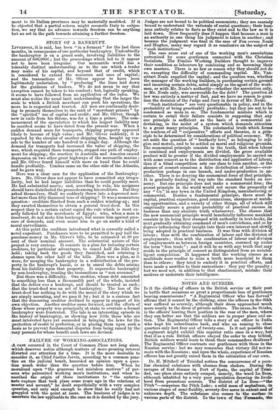FAILURE OF WORKING-ASSOCIATIONS.
A Qum occurred in the Court of Common Pleas not long since, ,which deserves notice although matters of more pressing interest • diverted our attention for a time. It is the more desirable to consider it, as Chief Justice Jervis, according to a common -pm- -tice on the judicial bench, hazarded an opinion. upon a ques- tion much wider than the question before him. When he moralized upon ." the generous but mistaken motives" of per- sons who patronized working men's institutions, and when he ascribed the origin of those institutions to "the unfortu- nate rupture that took place some years ago in the relations of -master and servant," he dealt superficially with a very complex question, and only said enough to show that he really had not grappled with -the point at issue. The business of judges is to -ascertain the law applicable to the ease as it is decided by the jury. Judges are not bound to be political economists; they are scarcely bound to understand the rationale of social questions; their busi- ness entirely relates to facts as they exist and to the law as it is laid down. How frequently does it happen that because a man is an authority in one thing his judgment is taken in another; and because the judgment was final in the ease of Fox versus Neale and Hughes, many may regard it as conclusive on the subject of "such institutions.
The case arose out of one of the working men's associations patronized by some gentlemen connected with the Christian Socialists. The Pimlico Working Builders thought to improve their condition as labourers by combining and so becoming their own masters. There is no law or reason why they should_not do excepting the difficulty of commanding capital. Mr. Iran- sittart Neale supplied the capital; and the question was, whether the manager of the working builders, in purchasing certainground and incurring certain debts, acted simply as the agent of the work- men, or -with Mr. Neale's authority—whether the association only, or Mr. Neale only, was answerable for the debt ? The question at law was entirely a matter of fact, and we have no reason to ques- tion the decision of the Judge and Jury in favour of Mr. Neale.
"Such institutions" are very questionable in policy, and in the probability of being practicably profitable; but they are not to be condemned as mala in se. The fundamental mistake which is certain to entail their failure consists in supposing that any one principle is sufficient as the basis of a commercial un- dertaking, in the midst of a system which demands attention to a great many principles. The substantial truth which forms the nucleus of all " cooperative " efforts and theories, is a •prin- oiple to be determined by considerations of political economy. We set aside the question of "brotherly love " as belonging to reli- gion and morals, and to be settled on moral and religious grounds. The economical principle consists in the truth, that when labour is combined and employments are divided, the gross available product will be greater if the divided employments be carried on with some concert as to the distribution and application of labour, than if ,a blind competition sets one class to rum another, or the absence- of concert occasions a false distribution of labour—over- production perhaps in one branch, and under-production in an- other. 'There is no denying the economical force of that principle. It is -gradually finding its way into the standard books on eco- nomy. But one principle does not make a eommercial firm; the purest principle in the world would not secure the prosperity of any "Co." in any town in the United Kingdom, manufaeturing or commercial. Besides a fundamental principle there must be capital, practical experience, good connexions, sharpness at watch- ing-opportunities, and a variety of other things, all of which will empirically secure a greater probability of practical seedless in business than any absolute truth whatsoever. The chance that the new economical principle would beneficially influence mankind consists in its being first stamped with authority in text-hooks, its next gradually obtaining command of men's convictions, and so by degrees influencing their insight into their own interest and slowly being adopted in practical business. It was thus with division of labour; thus with the combination of labour and the division-of employments ; thus with the combination of labour and _division of employments as between foreign countries, summed up under the term free trade " ; and it will be so with any truth that-may reside in the principle of concert as distinguished from an unintg- ligeut competition. It happened that the working classes as a multitude were readier to seize a truth more beneficial to them than to others ; they tried to embody it in practical efforts, and have made a sacrifice to their earnestness : they pay the penalty ; butt we need not, in addition to that chastisement, mistake their motives or underrate their intelligence.






































 Previous page
Previous page